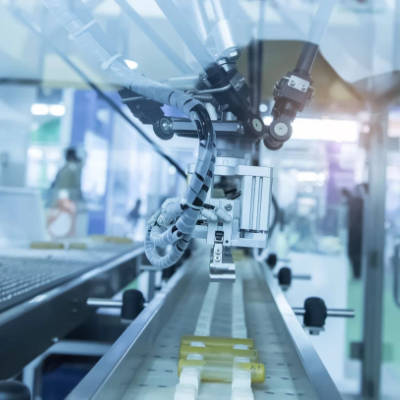
Industry 4.0
Digitization and smart technologies changing the industry.
Industry 4.0 is a concept of production managed on the basis of data and information acquired from the data. Our solutions help connect multiple elements of a production process, make them communicate with each other and make them capable of cooperating with each other without human intervention.
Industry 4.0 solutions allow one to automate decision-making processes, monitor resources and processes in real time. They also allow for vertical and horizontal integration of production-supporting applications.
Industry 4.0 – technologies
Industry 4.0 is inseparable from new technologies in the domains of communication, data acquisition and processing. Among multiple solutions we offer within the Industry 4.0 framework, one can count:
Industrial Internet of Things (IIoT)
Industrial Internet of Things (IIoT) is a network constituted by devices equipped with sensors, software and other technologies that connect over the Internet. Devices connected within the Internet of Things are able to communicate, interact and realize complex tasks without human intervention.
Internet of Things is the crucial component of smart factories. Production machines fitted with sensors that have IP addresses may connect to and cooperate with other devices and systems that have access to the Internet. Automation and continuous communication allow one to collect, analyse and exchange large amounts of valuable data in real time.
Augmented Reality (AR)
“Smart glasses” – fitted with a number of communication solutions, such as a display, loudspeaker, microphone, camera, GPS system or Wi-Fi unit – constitute the basic AR component. The glasses allow users to communicate with IT systems that support their work. Many of our applications are capable of cooperating with smart glasses. To name a few: the Manufacturing Execution System (MES) the Computerised Maintenance Management Systems (CMMS), the Supervisory Control And Data Acquisition System (SCADA), the Warehouse Management System (WMS).
Smart glasses are capable of transmitting various types of information, for instance:
- descriptions of tasks to be performed by an employee,
- parameters of sensors,
- diagrams,
- instructions
Artificial intelligence/machine learning
Machine learning technology or systems capable of learning are pieces of software that are able to automatically improve and optimize their performance on the basis of acquired knowledge. To build up their knowledge, they take advantage of data and information supplied to the system.
Artificial intelligence and machine learning allow production companies to take full advantage of the data generated in production shops and of the data acquired from other domains, including parameters and external sources. Thanks to these methods, it is possible, for instance, to create advanced models of inference and prediction. Our solutions allow for efficient implementation of many modern methods of production management, such as, for instance, predictive maintenance.
Edge computing
Management of production operations in real time means that some of data analyses must be performed on the edge, i.e. at the place, where data are generated. This solution minimises the time required for reaction. When a problem related to production safety or quality arises, it may require reaction in near real time. The time required to transfer data to cloud computing resources and back to a production shop may be too long and dependent on network reliability. Thanks to the edge computing methods implemented in our systems, data to be processed remain close to their source, which increases their safety.
Cyber security
Communication of hardware and software (Operating Technology (OT)) within Industry 4.0 creates new risk in the form of cyber-attacks and malware incidents. Potential data leaks or disturbances in systems operation constitute significant risks for plant functioning. Among multiple protective measures implemented in our solutions for industry, one can mention:
- file signature – the system recognizes modified software files,
- 128-bit encryption of data exchange within the network between servers and clients,
- encryption compliant with TLS 1.3 protocol,
- authentication – only logged-in users are granted access to a server,
- HTTP Tunnelling technique for the web server,
- continuous redundancy.
Digital twins
Our solutions allow manufacturers to create the so-called digital twins that are virtual replicas of processes, production lines, plants and supply chains. Such a virtual replica is updated in real time with the data that originate, among others, from sensors, PLC controllers or IT systems. Thanks to implementation of simulation and machine learning algorithms, a digital twin allows one to test proposed modifications and identify their potential effects before such modifications are actually implemented. This helps optimize decision-making processes.
Cloud computing
Cloud computing constitutes the base for every strategy of Industry 4.0. Complete realization of the idea of smart production requires communication between and integration of departments of planning, production, sales, distribution and servicing. This becomes possible thanks to cloud computing. Large amounts of stored and analysed data may be processed in the cloud in a more efficient and economically rational manner. Cloud computing can be particularly beneficial for small and medium-sized manufacturers, who may adequately adapt their needs and scale them as their companies develop.
Company
Contact
- +48 (12) 646 98 00
- +48 (12) 646 98 02
- info@quantum-software.com
- quantum-software.com